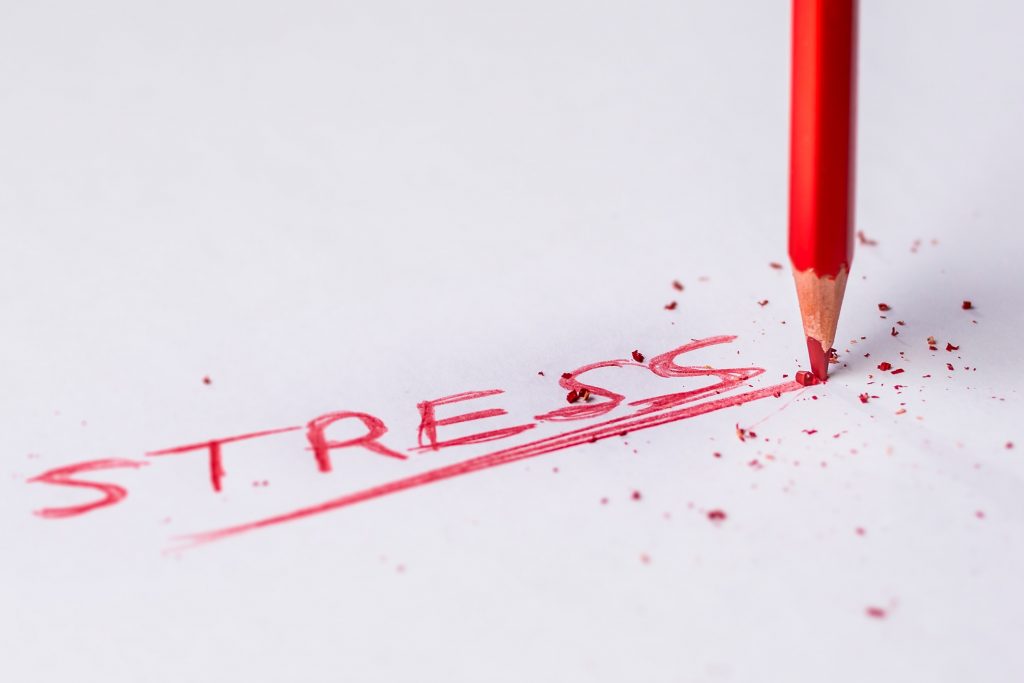21 Ways to Combat Chronic Stress
21 Ways to Combat Chronic Stress

You have a very important deadline for work in just a few days and you are nowhere near done with the project. Your boss is texting you every hour to ask when it will be finished. In addition, one of your children is sick and can’t go to school so you are trying to work from home while tending to your child. Your dog got injured after chasing a squirrel through the blackberry bushes (which you need to try and get rid of but have not had any extra time to do yardwork recently) and needs to go to the vet. Your refrigerator is almost empty and you have no idea what you will fix for dinner or when you’ll be able to get to the grocery store. You are feeling very maxed out due to the many demands you face! Stress is inevitable and unavoidable. A little stress may even be a good thing since it may help make you more productive and creative. But sometimes there is just too much stress!
Your body is geared to react to stress in ways that protect you against physical threats and attacks. While it is rare that we are faced with a predator or other aggressor, our body reacts to stressful events and situations (such as those mentioned above) in a way that is similar to how it reacts to physical threats. When you face a threat (such as a large dog barking at you while you are on a walk around your neighborhood), your body reacts by releasing hormones including adrenaline and cortisol so that you are geared up for a “Fight-or-Flight” response.
Adrenaline increases your heart rate and blood pressure. Cortisol (which is your body’s main stress hormone) increases blood sugar and increases your brain’s use of these sugars, providing increased energy so you can either get away from the perceived threat by running (Flight) or are able to protect/defend yourself (Fight). Cortisol also slows body functions that are not essential or could even be harmful in a Fight-or-Flight situation, such as digestion and your immune system. For example, blood flow is redirected from the digestive tract to the brain and large muscles so you can deal more effectively with the threat.
We need cortisol to survive, but too much cortisol can cause problems. Occasional or temporary stressful situations may not be harmful; however, chronically elevated cortisol levels, as is seen with chronic stress, can lead to weight gain, negative effects on the immune system, and risk of chronic illnesses and mental health disorders. High cortisol levels are thought to increase fat accumulation, especially around the waist and also to increase the ability of fat cells to store fat. Cortisol is also an appetite stimulant causing you to eat more when you are stressed.
Stress also indirectly causes weight gain. We often turn to “comfort food” when we are under a lot of stress. In addition, when we are experiencing stress, it is often more difficult to find the motivation to exercise and to resist the temptation to eat unhealthy foods. Stress can also interfere with sleep. When we are sleep deprived, we are less likely to make healthy food choices. Sleep deprivation can be its own source of stress on the body, setting up a vicious cycle.
So how can you reduce chronic stress and subsequently reduce cortisol levels? First, try to identify what is causing your stress. Lots of times we feel stressed and don’t even know why. Next, either work to eliminate the source of stress, or if that is not possible, take steps to manage the impact the situation has on you. Choosing healthier ways to manage stress and not letting it control your life is important. Taking a holistic approach to weight loss that includes stress reduction will likely lead to better overall health and the probability that you will successfully achieve and maintain your weight loss goals.
Here are 21 tips to help reduce your stress:
- exercise for 30 minutes or more
- go outdoors and enjoy the beauty of nature
- choose healthy foods to nourish your body (lean meats, beans and legumes, whole grains, fruits and vegetables)
- call a friend or family member
- do yoga for 10 minutes
- ask family or friends for help so you have more time for you
- listen to music as you are doing chores
- read a good book (or listen to an audiobook)
- go to bed 1 hour earlier than you normally do
- pet a dog or cat
- practice positive self-talk
- say “no” to something that may cause stress
- meditate (See below for how to do a One Minute Meditation)
- breathe deeply for a few minutes
- cross a nonessential item off of your to-do list
- take time to engage in hobbies you enjoy
- avoid caffeine and alcohol
- write your thoughts in a journal; focus on what you are grateful for
- watch a funny movie or YouTube video
- volunteer in your community
- seek professional counseling to help you develop coping strategies for stress
One MInute Meditation
When you feel stress piling up in your life, take 1 minute to practice meditation. This can help you manage the stress that inevitably will pop up in your day. You can do this anywhere and at any time, as you are standing or sitting, or even before you get out of bed in the morning.
Steps:
–Close your eyes and breathe deeply in through your nose and out through your mouth.
–Focus on how your body expands as you breathe in and softens as you breathe out.
–Allow thoughts to come and go while continuing to gently refocus on your breathing.
–When you are ready, reopen your eyes.
–Pause for a moment and decide how you’d like to continue on with the rest of your day.



